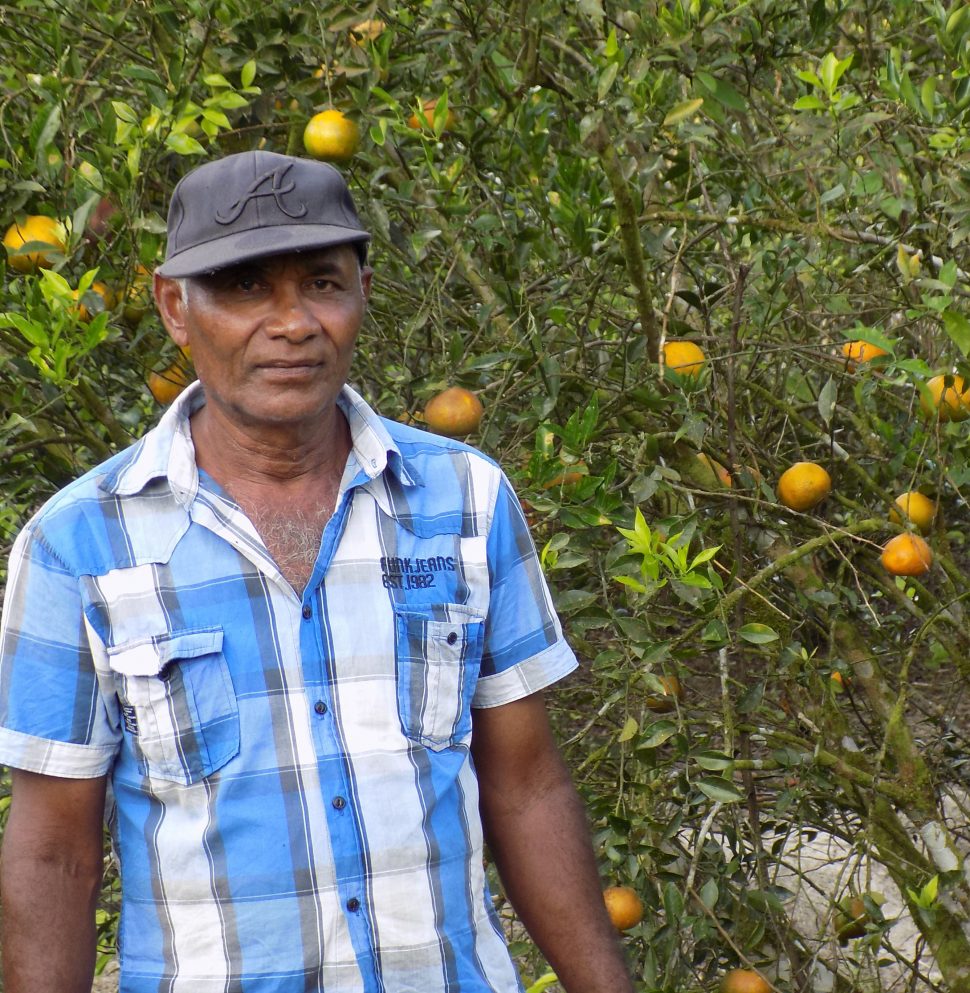If you want to get a compelling sense of the wide variety of fruit cultivated on farms across Guyana you can do worse to travel to Roy Boodhoo’s 131-acre farm aback of Parika at Hubu, on the East Bank of the Essequibo river. The sprawling plantation, literally an agro processors’ dream, offers up crops of soursop, limes, lemons, tangerines and coconuts, so plentifully that try as he seemingly does the demand for what Boodhoo’s farm yields is simply not sufficient to match the bounty provided by the land.
Roy used to be a cattle farmer but all that is behind him now. He has been farming for the past nine years and now the bounty has simply overwhelmed him.
The farm is not idle. It is operational. Roy is up early each morning either to visit the farm or head for the market to sell what he can. He concedes, however, that market limitations have, these past few months, provided him with sorry little incentive to visit the farm. It is, he says, simply not worth the effort. It is preferable to simply leave the fruit to rot. This time around he is anticipating heavy losses on coconut, citrus and soursop.
Boodhoo comes from a Canal No 1 farming family and farming has been his own “whole life.” He began with cash crops and cattle. Fruit, including sugar cane, have been his pursuit since 2009.
He is considered one of the ‘big players’ in the agricultural sector on the East Bank of the Essequibo River. His 131 acres holds 1,400 soursop trees, 2,400 lemon trees, 900 tangerine trees, limes, lemons, coconut and sugar cane. He accesses the ‘plantation’ by boat. The farm is split in two by a narrow trench so that he can gain access to both sides at points of his choosing. Three boats have been acquired over time to transport produce to the Hubu Koker where it is loaded onto his Canter and driven to various markets mostly at Vreed-en-Hoop, Stabroek, and Bourda, among others. The vendors anticipate his wholesale prices.
One of the valued customers of the National Agricultural Research and Extension Institute, he purchases most of his plants from the state-run facility.
Boodhoo says that his days as a substantive farm worker are now behind him. He has recruited five workers and, he says, pays them well in the hope that they will keep the farm going. Weekend revelry and occasional community ‘events’ sometimes impact on punctuality and attendance at work.
His own visits to the farm, these days, occur mostly at crop time. Soursop, particularly, gets his attention. They must be removed from the tree at “just the right time.”
Markets remain a preoccupation. It is not that there is not significant overseas demand for what he has to offer. The challenge however, reposes in fulfilling the myriad obligations associated with exporting fruit in the region, far less to North America and further afield. There are days when local market prices leave him decidedly unfulfilled. On terrible days he is reduced to giving his produce away. There is, as well, the incentive afforded by offering consumers credit. Regrettably, those arrangements frequently end up with the debtors neglecting to honour their debts.
Boodhoo’s farm is a five-minute boat ride away from his home at St. Lawrence. We went there in his small outboard motor boat. On the way we witnessed the jaw-dropping sight of scores of lemons, some the size of grapefruit, lying on the ground. Those would remain there to rot. Understandably, birds have taken up permanent residence on the farm. For them, the yield of fourteen hundred soursop trees and nine hundred tangerine trees amount to endless days of gourmet dining. .
There is a decidedly old-fashioned perspective to Boodhoo’s business outlook. The old ways, he says, have worked for him. He is decidedly indifferent to ‘lectures’ on the dividends which his farm can derive from diversification into the agro processing sector. Perhaps his son and his University-educated daughter will create the linkages in the fullness of time.
He spoke with Stabroek Business about potentially lucrative supply contracts with supermarkets which he said he had set aside because of what he saw as the ‘complications’ of those kinds of transactions.
Even the difficulties associated with ‘finding markets,’ however, have failed to quell Boodhoo’s farming spirit. We visited his nursery where he tends 1200 citrus plants. When we asked about the size of the nursery given the challenges which he already faces with finding markets Boodhoo simply responds that farming is his life.
There may, however, be hope yet for the fortunes of Boodhoo’s farm. An enterprising daughter is beginning to pay an interest and she is hatching agro processing plans. In July she visited the farm for the first time and, it appears, has been galvanized into action by the sheer waste which she witnessed. This week she was continuing to build her knowledge base in agro processing. She is, as well, probing the investment potential, begun to source equipment and been engaged with commercial banks on the matter of project financing. These days, his daughter says, there is an expression of somewhat greater satisfaction on her father’s face.





